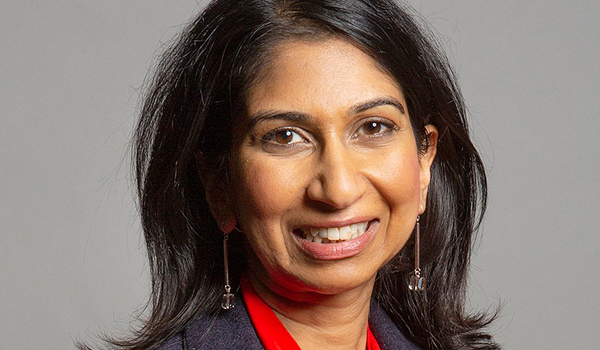‘Common sense policing’ must come first over ‘symbolic gestures’, Home Secretary tells police chiefs
The Home Secretary has told police forces that “symbolic gestures” on diversity and inclusion “should not take precedence over common sense policing”.
In an open letter to police chiefs in England and Wales on Saturday (September 24) Suella Braverman set out her “key priorities” for policing and her crime-cutting agenda.
Ms Braverman said the last few years have been challenging for policing and she is “dismayed by the perceived deterioration of public confidence in the police”.
“We have seen too many high-profile incidents which have shattered public trust in communities across the UK,” she said.
“Culture and standards in the police have to change, particularly in London.
“It is absolutely vital that trust is restored and to address this, we must have visible and responsive policing. It must deliver the public’s priorities, and it must treat victims with the respect they deserve.
“The public have a right to expect that the police get the basics right: driving down anti-social behaviour and neighbourhood crime which can so easily rip through our communities.
“To put it simply, the public want to know that an officer will visit them after a crime such as burglary. They want to feel safe in their cities, towns and villages.
“This is not just about doing your day job well, it is also about victims needing to feel supported and not ignored.”
Ms Braverman said “unfortunately there is a perception that the police have had to spend too much time on symbolic gestures than actually fighting criminals”.
“This must change,” she said. “Initiatives on diversity and inclusion should not take precedence over common sense policing.”
Ms Braverman said reducing crime was “a key Prime Ministerial commitment”, and she expects the police, working with local partners, to cut homicide, serious violence and neighbourhood crime by 20 per cent.
“I have been heartened to learn that overall crime, excluding fraud and computer misuse, has continued to fall over the last decade, but there is more we must do to see a further reduction,” she added.
“We also need to see a renewed focus on tackling neighbourhood crime and anti-social behaviour. Drugs, vehicle theft, vandalism and graffiti are not being treated seriously enough.”
Ms Braverman said she was also “deeply concerned” by the current levels of cases being investigated and then being converted into charges and subsequent prosecutions.
“I want to investigate how we can improve charge rates which have dropped for many crimes, but none more so than for rape and sexual offences against women and children,” she said.
“I will expect all forces to engage with the learning from the Operation Soteria pilot and strongly encourage you all to take up the national model when available from June 2023 for all forces. Simply put, the system needs to work better together: we need more police referrals and more Crown Prosecution Service charges.
Ms Braverman said she was committed to ensuring all forces have the necessary resources and tools to respond to the evolving profile of crime.
“This is why I am steadfastly determined to deliver the additional 20,000 officers promised through the Police Uplift Programme and I expect all chief constables and police and crime commissioners (PCCs) to be on track to fully deliver force level allocations by March 2023 and then maintain officer numbers,” she said.
“We are seeing a growing and strengthened workforce and in order to fully support policing this Government has committed to investing hundreds of millions in 2022/23. This funding will provide police with the tools they need to meet the technological challenges of the future; this includes £100 million over the next three years to tackle fraud.
“We must work effectively and transparently as individuals and as a system to cut crime and improve performance and accountability, underpinned by good, consistent data.
“An effective system which meets the public expectation sees PCCs driving local policing priorities and acting as strong, visible leaders; chief constables leading the local operational response; forces working in close collaboration with their Regional Organised Crime Units, National Crime Agency, wider law enforcement and partner agencies to disrupt the organised criminal groups whose activities undermine our core British values; and the wider policing system pushing the service to operate as efficiently as possible.”
Ms Braverman added: “At its best, policing in this country is the best in the world.
“That must and can be the standard that all forces hit. You have my full support in making that happen.”


